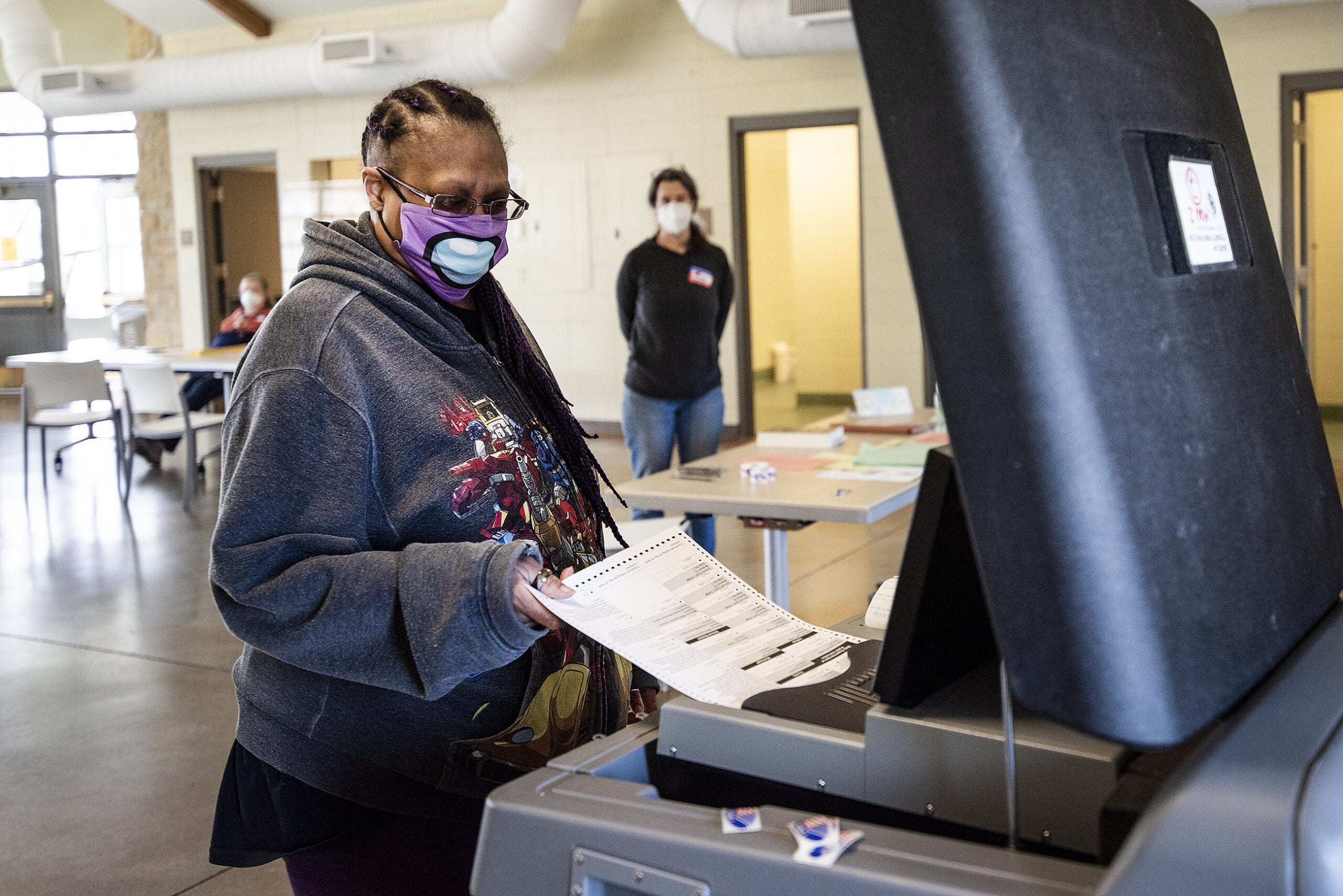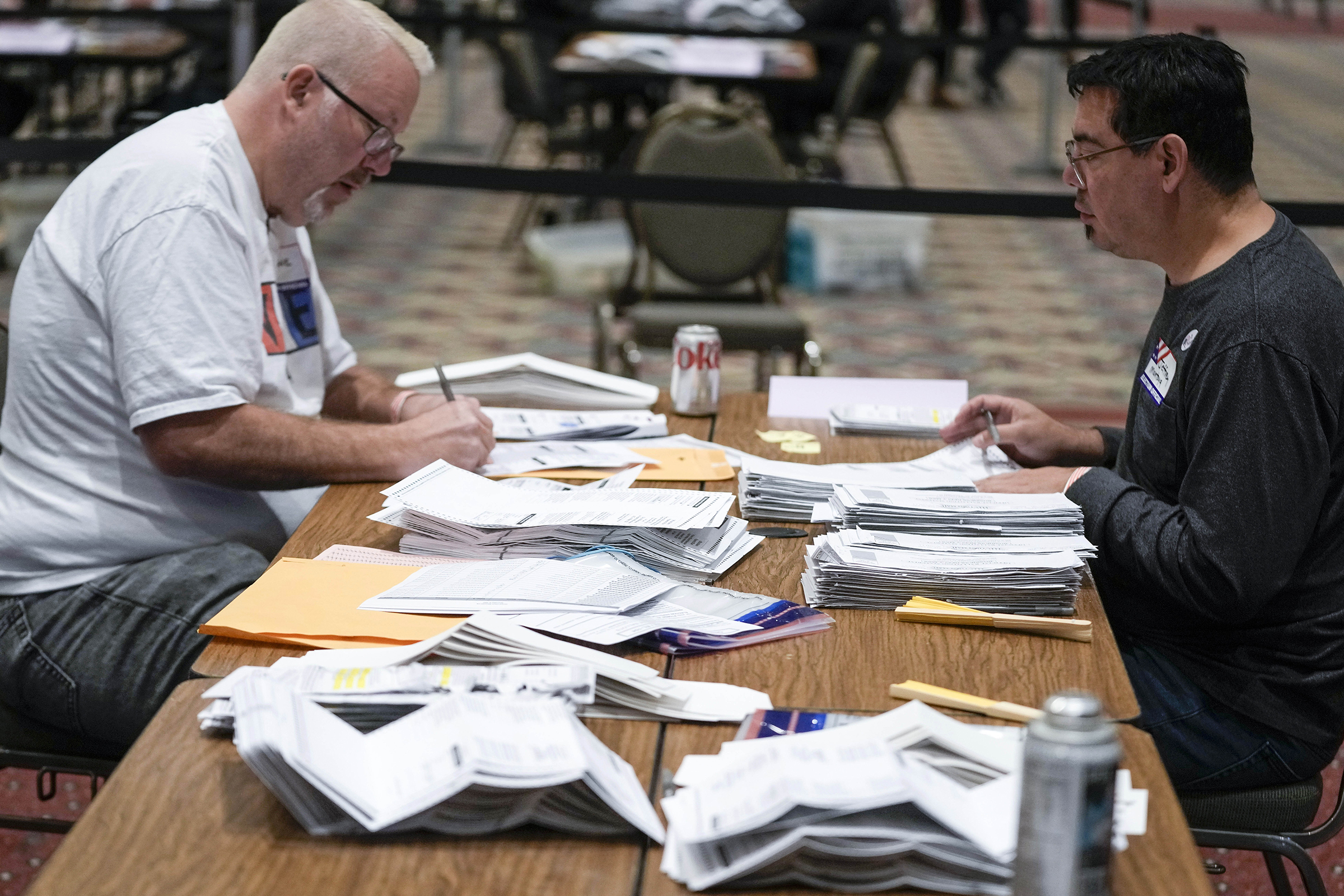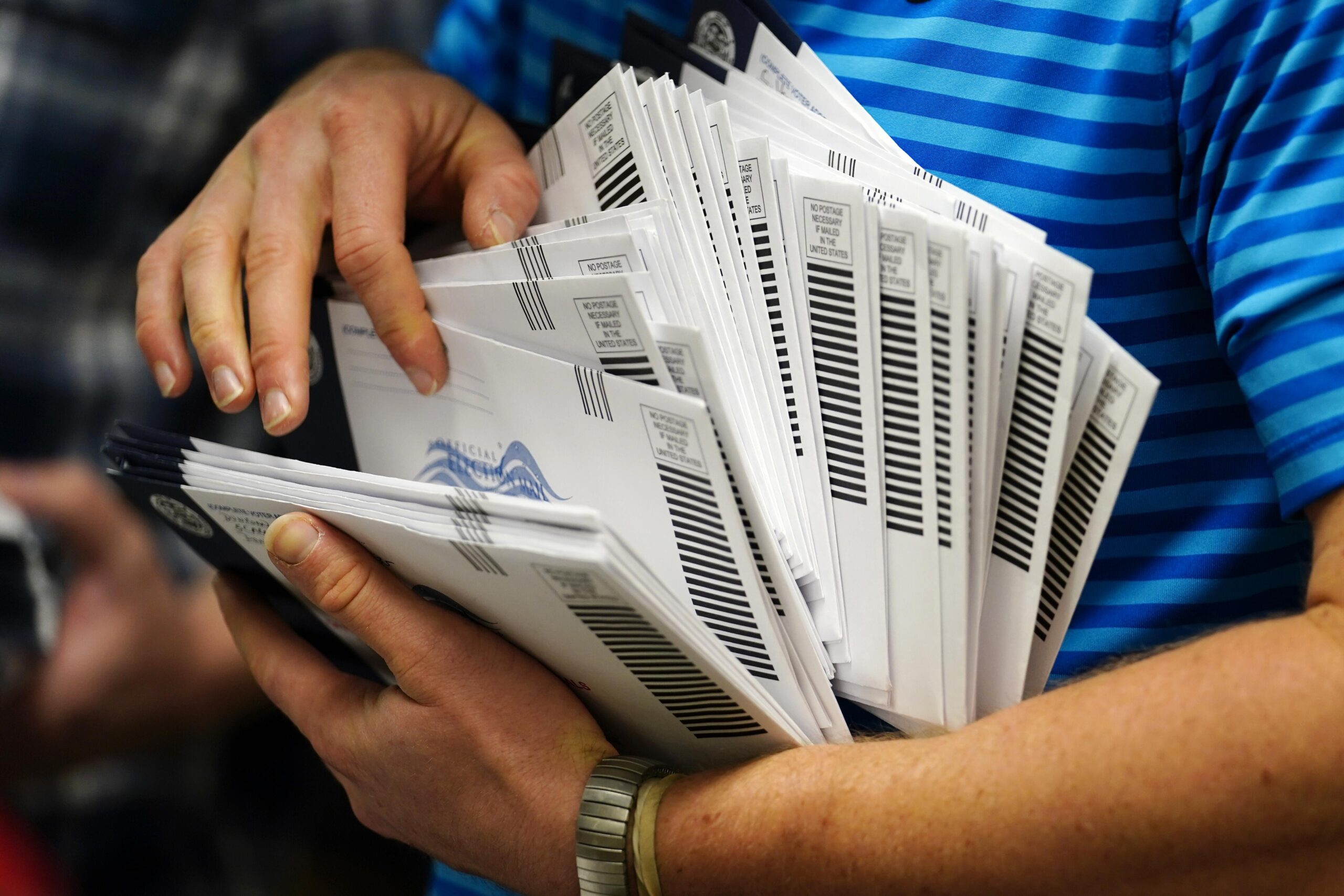With roughly a month to go before they’re scheduled to adjourn their legislative session, GOP lawmakers are pushing a package of bills that would give themselves more power over elections and put up more obstacles for voting absentee.
Republicans would also ban some of the activities that took place in the 2020 election like private grants to help run elections and absentee ballot applications that were sent to millions of voters across Wisconsin.
Sen. Kathy Bernier, R-Chippewa Falls, is the chair of a Senate election panel that heard hours of testimony Monday on the package of election proposals. She said the steps taken to safely administer elections during a pandemic need to be left in the past.
News with a little more humanity
WPR’s “Wisconsin Today” newsletter keeps you connected to the state you love without feeling overwhelmed. No paywall. No agenda. No corporate filter.
“During the pandemic, we had an extraordinary situation,” Bernier said. “I think it’s time to move on past that.”
But those changes, critics argue, have a common thread: Most would either put more restrictions on the agency that runs elections or put up more barriers for voters.
Debra Cronmiller, executive director for the League of Women Voters of Wisconsin, spoke against the bills.
“Some make it much harder for voters to apply for and cast an absentee ballot,” Cronmiller said. “Some can only be characterized as a power grab by a legislative branch seeking to control elections. Given that none of these proposals would improve elections, they would be a net loss for voters.”
The measures come as former President Donald Trump has pressured Republicans to change election laws, falsely asserting that he won swing states like Wisconsin two years ago. In Wisconsin, Assembly Republicans have commissioned an investigation of the 2020 election.
Bernier, a former clerk, has been among the most outspoken Republicans to push back on Trump, but she acknowledged Monday that some of her bills were drafted, in part, to address the concerns of people who don’t trust Wisconsin’s elections.
The GOP plans include some common themes.
More power for the Legislature
The Legislature, which is controlled by large Republican majorities, would gain new powers to block voting funding and policies, including guidance from the federal government.
- One of the plans, sponsored by Assembly Speaker Robin Vos, R-Rochester, and Senate Majority Leader Devin LeMahieu, R-Oostburg, would potentially clamp down on federal election funding in Wisconsin. It would require the Wisconsin Elections Commission to submit plans for all federal funds to the Legislature’s budget committee. That would give GOP lawmakers the power to block the funding.
- The same bill would also give lawmakers new powers to block federal election policies. It would require all federal election guidance to be presented to the Legislature’s Joint Committee for the Review of Administrative Rules before it could take effect. If the Republican-controlled panel objects to the guidance, it could block it. Even if the committee does nothing at all, it could still delay the guidance from taking effect for 30 days.
- Another plan would give the Legislature even more power over the regular operations of the Wisconsin Elections Commission. It would require all the agency’s guidance documents for local clerks to be presented to the Joint Committee for the Review of Administrative Rules on a weekly basis. If the committee decides that “guidance” is actually a “rule” (a regulation, standard, or statement that carries the force of law), committee members could order it immediately withdrawn. The practical effect would give one legislative committee an instant veto over a wide range of election policies in Wisconsin.
- Yet another bill would give the Legislature the power to punish the Wisconsin Elections Commission, the state Department of Transportation and the state Department of Health Services if they don’t comply with election laws. It would require the elections commission to submit a report on any failures to comply with voting laws. The Legislature’s budget committee would then have the power to cut staff at the agencies or immediately cut their budgets.
More obstacles for absentee voting
The Republican bills would make absentee voting more difficult in a variety of ways.
- One would make it harder for people to say they’re “indefinitely confined” in order to request an absentee ballot, an option record numbers of Wisconsin voters chose in the 2020 election.
Under current law, someone who is indefinitely confined “because of age, physical illness or infirmity or is disabled for an indefinite period” can request that an absentee ballot be sent to them every election.
The GOP bill would restrict that to voters who “cannot travel independently without significant burden because of frailty, physical illness, or a disability that will last longer than one year.” Voters would need to fill out a special form to qualify.
People would not be allowed to claim indefinite confinement because of an outbreak, like the COVID-19 pandemic. And anyone who signed up as indefinitely confined between March 12, 2020 and Nov. 6, 2020 would be removed from the list. People who falsely claim to be indefinitely confined could face up to six months in jail.
Republicans have called for restrictions on indefinitely confined voting after nearly 216,000 voters claimed the status in the 2020 presidential election, up from about 57,000 in 2016. They included former Lt. Gov. Rebecca Kleefisch, one of the Republicans running for governor, whose campaign told the Milwaukee Journal Sentinel she chose the designation by mistake.
Critics of the plan say the GOP plan has no legal or medical justification and makes the process more burdensome for people who are unable to vote in-person.
- Another GOP bill would reject absentee ballots if an accompanying witness certificate is missing information about the voter or the witness.
Under the bill, the certificate would have to include both the voter’s and witness’ printed full name, address and signatures. If any information is missing, the ballot would be rejected.
The bill would reverse a Wisconsin Election Commission policy in place since 2016 that lets clerks fill in missing information on absentee ballot envelopes. It was initially supported by all Republican and Democratic commissioners. The commission recently affirmed that position by a 4-2 bipartisan vote despite a warning by GOP lawmakers that the move could land the agency in court.
A nonpartisan audit of the 2020 election found nearly 7 percent of absentee ballots had incomplete witness certificates. Critics say many of those ballots would be rejected under the latest Republican bill, disenfranchising potentially hundreds of thousands of voters.
“We know that any additional bureaucratic requirement, no matter how small it’s seen within this Capitol, will result in additional absentee ballots being rejected,” Madison City Attorney Mike Hass, the former head of the state Elections Commission, said.
- People could no longer sign up for absentee ballots for all of the primaries and elections in a calendar year under another GOP proposal. Instead, they’d have to apply for every election separately, uploading a digital copy of their photo ID each time.
- Republicans would also ban the state or local election agencies from mailing voters absentee ballot applications. In 2020, the Wisconsin Elections Commission voted 6-0 to send absentee ballot applications to 2.7 million voters.
Banning private election grants
Republicans are also trying to ban private election grants like those distributed in 2020 by the Center for Tech and Civic Life, an organization funded by Facebook CEO Mark Zuckerberg and his wife, Priscilla Chan.
While the organization has said it awarded grants to a total of 221 counties, cities, towns and villages in Wisconsin, the organization spent millions of dollars on grants to Milwaukee, Madison, Green Bay, Kenosha and Racine, the state’s five largest cities.
A group of Republican plaintiffs organized under the name Wisconsin Voters Alliance challenged the grants in court in 2020, arguing they were meant to boost turnout in Democratic strongholds. The group lost cases in both state and federal courts, with a federal judge ruling there was nothing in Wisconsin law that prevented the grants.
Two measures being pushed by Republicans would change that. One, which is part of a larger election bill, would ban private election grants and make it a felony — punishable by up to three-and-a-half years in prison — for anyone to help count or tabulate votes unless they’re a Wisconsin resident who is trained as an election official.
“Why is that fair that somebody can just parachute into Milwaukee with millions of dollars?” said state Sen. Duey Stroebel, R-Saukville, at the hearing on the plan.
Brenda Wood, a lobbyist for the city of Milwaukee, said the city used part of its funding to boost pay for poll workers, and spent more than $1 million on seven high-speed vote tabulators that let the city complete its count by 3 a.m. the morning after Election Day. She said the city needed that money because state shared revenue payments to Milwaukee have decreased over the past couple decades.
“It’s not really responsible to not allow us to find alternate sources of funding,” Wood said.
Gov. Tony Evers vetoed a similar measure last year and is all but certain to veto this plan, but another proposal by Republicans would sidestep the governor. It would amend the Wisconsin Constitution to ban private election grants. That measure would need to pass two consecutive sessions of the Legislature and be approved by voters in a statewide election to take effect. That means it would not affect this year’s elections, but if approved, it could take effect before the 2024 presidential election.
Possible prison time for nursing home employees
Republicans would also clarify how residential care facilities and retirement homes should handle voting for residents in future pandemic elections.
Typically, residents in nursing homes and other facilities vote absentee with the help of special voting deputies who are dispatched to the home. When possible, state law calls for two deputies per visit, with one from each party.
In March 2020, the Wisconsin Elections Commission unanimously paused that requirement because of concerns that the deputies could carry COVID-19 to nursing homes, endangering the health of older residents or people with pre-existing conditions.
Republicans have alleged that the change led to some nursing home residents casting votes against their will, but disability rights advocates have pushed back against those claims and no charges have been filed.
One of the GOP election bills would let local clerks appoint “personal care voting assistants” during a public health emergency when entry to nursing homes is restricted. These would be existing employees of the home who undergo training.
At the same time, the plan would make felons out of nursing home employees who “coerce” residents to apply for absentee ballots or register to vote. Employees would also be banned from encouraging residents to vote for a particular candidate. Anyone found guilty could face up to three-and-a-half years in prison.
“The fact that the term ‘coercion’ is not defined in the bill and carries a strong penalty will likely result in staff not wanting to assist anyone in registering to vote,” Stephanie Bloomington, a voter from Sturgeon Bay living with a disability, said.
Partisan lawyers for the Wisconsin Elections Commission
Right now the board that runs the Wisconsin Elections Commission is explicitly partisan, with three commissioners appointed by Republicans and three appointed by Democrats. That 3-3 split has increasingly led to gridlock at the agency with neither side willing to budge.
Staff at the agency is a different story because lawyers who advise the commission are expected to be nonpartisan under current law. But one of the GOP election bills would change that, requiring the commission be advised by one Republican and one Democratic attorney. GOP lawmakers say this would “guarantee viewpoint diversity” at the commission, and make sure commissioners have someone “advocating for them.”
New checks for the state’s voter list
Multiple bills would also strike residents from Wisconsin’s voter list if their registration information conflicts with other government databases, which GOP sponsors say would keep the list current but critics worry could remove people at no fault of their own.
- One of the plans would require the Wisconsin Elections Commission to check a multi-state database of government records called the Electronic Registration Information Center, or ERIC, every 90 days. If the ERIC records don’t match the state’s registration database, the commission would be required to send a letter or postcard to the voter to let them know about the discrepancy. If voters don’t change it, they’d be marked as ineligible. While the commission already uses the ERIC list, in 2019 the database mistakenly identified thousands of voters who had not moved.
- Another GOP bill would require the state to check the Systematic Alien Verification for Entitlements database maintained by the federal Department of Homeland Security to verify that people are United States citizens before sending them absentee ballots.
- Republicans are also calling for a new check on the state’s registration list where no later than 10 days after someone updates their registration, the Wisconsin Elections Commission must compare it to information on file with the state Department of Transportation. If there’s more than one discrepancy, the state would notify the voter and could remove them from the voter list.
Plans likely headed for veto but could be back
While these bills and others related to elections could pass the Legislature before lawmakers adjourn for the year, Evers is likely to veto the plans.
Asked about the bills at a recent event in Milwaukee, Evers said he supports the Wisconsin Elections Commission as-is and said the current system works.
“We pride ourselves that we’re in a democracy,” Evers said. “And one of the most important parts of democracy — the most important part of a democracy — is the vote. And we encourage people to vote. And if we’re going to be trying to suppress voting, that’s a non-starter for me.”
Evers vetoed a similar package of Republican election bills last year.
But if Evers were to lose his reelection bid, his Republican challengers, Kleefisch and former U.S. Senate candidate Kevin Nicholson, have pledged major changes to election laws. Both Republicans have also called for abolishing the Wisconsin Elections Commission altogether.
Wisconsin Public Radio, © Copyright 2025, Board of Regents of the University of Wisconsin System and Wisconsin Educational Communications Board.







